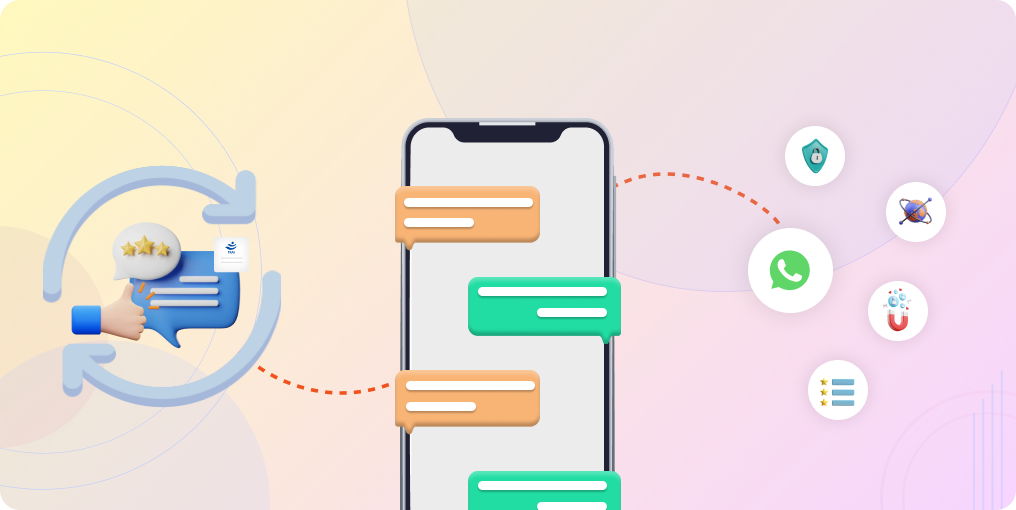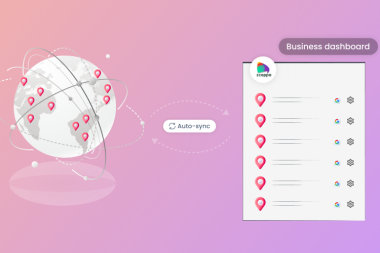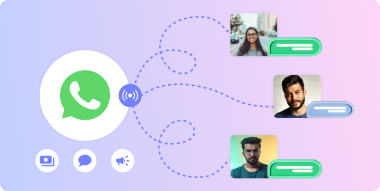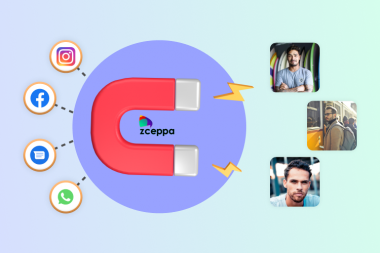Whatsapp Vs SMS and Why You Need to Switch Now

Business communication and direct messaging continue to evolve at a rapid pace. From conventional channels like telephone and email, to SMS and direct messaging across search and social platforms, there are plenty of choices. SMS, a de facto business communication channel, has been locked in a battle with the rise of Whatsapp over the last few years – In the Whatsapp Vs SMS duel, we see some interesting developments.
Why?
TRAI’s recent changes to curb unsolicited SMS to consumers can play an impact. Want to know more?
We dive into it in the rest of this blog – the latest regulatory changes in SMS Marketing & why Whatsapp is making inroads. In the war of messaging channels, the SMS Vs Whatsapp battle just got more interesting in India!
Read on to understand why Whatsapp may have an edge.
Regulatory changes and impact on SMS Delivery
Telecom Regulatory Authority of India (TRAI) has issued several Directions to curb Unsolicited Commercial Communications (UCC) through voice calls or messages using telecommunication services. Telecom Commercial Communications Customer Preference Regulations, 2018 (TCCCPR-2018) govern these.
Read more about the latest regulation here.
In a nut-shell, businesses that rely on SMS heavily, need to fulfil a set of regulatory obligations in order to send out customer communication. This includes feedback requests, customer experience surveys, review requests etc.
For example if you are a Bank, Mutual Fund, Insurance Company, Stockbroker, other Financial Institutions, Healthcare Provider or Corporate and Enterprise you are required to sign up on DLT Platforms. You need to have explicit consent from customers to send out communication.
This recent change moves all Service Explicit templates into the Promotional Category. This could directly impact SMS delivery based on consumers’ DND setting. For example, if you have certain Feedback Surveys, Review Requests, Account Information that you send, they will require explicit consent once this change comes into effect in July 2024.
While the idea is to help consumers from receiving unwanted spam/fraud, service related SMS could also get impacted in this. (Please note that these are very specific to India.)
Why? Delve a bit deeper to know more. Service Explicit SMS – What are these?
As per TRAI, messages are categorised as Service Explicit when they require explicit consent from the recipient. These messages typically contain information or updates that the customer has explicitly requested or agreed to receive.
Examples of Service Explicit Messages:
- Subscription Renewal Notifications: “Your subscription to XYZ service will expire on 30th June 2024. Click here to renew.”
- Account Activity Alerts: “A login attempt was detected on your account from a new device. If this was not you, please secure your account immediately.”
- Maintenance Notifications: “Scheduled maintenance will occur on our network from 2 AM to 4 AM on 25th June 2024. Services may be temporarily unavailable during this period.”
- Customer Feedback/Review Requests: “Thank you for visiting us. Please take a moment to provide feedback on the service you received today”
Key Characteristics of Service Explicit Messages:
- Consent Requirement: Businesses must obtain explicit consent from the customer to send these messages. This consent is typically gathered through an opt-in process where the customer agrees to receive specific types of messages.
- Content Type: These messages often include service updates, alerts, and information that the customer has expressed an interest in. Examples include:
- Renewal reminders for subscriptions or services.
- Notifications about account activities or changes.
- Alerts about service outages or maintenance schedules.
- Non-Promotional Nature: While these messages provide important information related to the service, they are not promotional in nature. They focus on delivering relevant service-related information that the customer has explicitly requested, including requesting for feedback and online reviews from customers.
- Regulatory Compliance: The sending of these messages must comply with TRAI regulations, including registration of message templates on the Distributed Ledger Technology (DLT) platform and ensuring that the customer has the option to opt out at any time.
In case your brand uses SMS extensively to communicate with customers there could be an impact to these messages being received.
SMS Vs Whatsapp – Delivery
For large businesses and multi-location brands, customer communication is critical – timeliness and deliverability of communication are important criteria. With this recent regulatory change, your SMS delivery itself could be in question.
Is it time to consider an alternative?
Whatsapp VS SMS for Service Related Messages?
In the Whatsapp Vs SMS battle, the swords have been drawn. Is it easier to communicate via Whatsapp than SMS?
Whatsapp dominates direct messaging along with a few others like Insta DMs, Telegram and so on.
While many traditional systems like banking, telecom continue to rely on SMS for critical communication and notifications to customers, Whatsapp is fast emerging as a possible winner. Whatsapp’s consumer base of 2 billion users, the ability for customers to respond to messages and the ability to block and report unwanted messages makes it endearing.
SMS and Whatsapp both have excellent open rates of upwards of 98%. But here’s where Whatsapp scores – Flow based interactions, the ability to flag spurious accounts makes it better for Customer Experience.
For now, Whatsapp parent Meta classifies customer feedback, surveys and review request messages under the “Utility” category unlike SMS where these fall within “Marketing”. This means Whatsapp template approvals are seamless and near-real time when using the official Whatsapp Business API and not subject to per user messaging limits. There is also a standard process of appeal for template category changes.
WhatsApp Per User Marketing Template Messaging Limits?
Is It Advantage Whatsapp?
WhatsApp offers several advantages over SMS as a customer communication channel, making it a preferred choice for many businesses. Here are some key reasons:
1. Rich Media Support
- Multimedia Messages: WhatsApp allows for sending images, videos, audio files, and documents, whereas SMS is limited to text and, in some cases, basic multimedia (MMS).
- Interactive Elements: WhatsApp supports interactive messages, including chaining multiple steps as flows, buttons and quick replies, enhancing customer engagement.
2. Enhanced Security
- End-to-End Encryption: WhatsApp provides end-to-end encryption, ensuring that messages are secure and private. SMS lacks this level of security, making it more vulnerable to interception.
- Verified Business Profiles: WhatsApp Business allows companies to create verified business profiles, adding a layer of trust and authenticity. The Green tick has given Whatsapp a layer of authenticity that was much needed
4. Advanced Features
- Delivery and Read Receipts: WhatsApp provides delivery and read receipts, allowing businesses to know when a message has been delivered and read. SMS only offers delivery receipts in some cases, and read receipts are not available.
- Automated Responses and Bots: WhatsApp supports automation and chatbot integration, facilitating instant customer service and handling routine inquiries efficiently.
5. Global Reach and Accessibility
- International Reach: WhatsApp is widely used globally, making it easier for businesses to reach international customers without the hassle and cost of international SMS. Multi-country communications are made simpler with Whatsapp.
- User Base: With over 2 billion users worldwide, WhatsApp has a vast and diverse user base, increasing the likelihood that customers are already familiar with and using the platform.
6. Better Customer Engagement
- Two-Way Communication: WhatsApp is designed for two-way communication, fostering more interactive and personalised customer interactions compared to the often one-way nature of SMS.
- Rich User Profiles: WhatsApp allows businesses to access more detailed user profiles, helping tailor interactions based on customer preferences and history.
7. Integration Capabilities
- CRM and Systems Integration: WhatsApp can be integrated with Customer Relationship Management (CRM) systems and other business tools, streamlining communication and enhancing customer relationship management.
- API Access: The WhatsApp Business API allows for seamless integration with existing business systems, enabling automated workflows and efficient message management.
8. Customer Experience
- Convenience: Customers can communicate with businesses on a platform they already use daily for personal messaging, making the interaction more convenient and familiar.
- Quick Responses: With features like quick replies and automated messages, businesses can provide faster and more efficient responses to customer inquiries.
In summary, WhatsApp offers a more versatile, secure, and cost-effective communication channel compared to SMS. Its advanced features and global reach make it an ideal choice for businesses aiming to improve customer engagement and satisfaction.
Good Read – Dive deep into some more key advantages of using Whatsapp for Business
Using Whatsapp as a default communication channel is fast becoming an absolute game changer for your business. It provides
However, the one big disadvantage of Whatsapp when compared to SMS is the cost angle.
Whatsapp platform fee and cost per message sent are significantly higher than SMS.
Conclusion
Zceppa, with its official Whatsapp for Business APIs, offers WhatsApp as a channel for all products on its platform. Businesses can subscribe to and configure SMS or Whatsapp for sending out Review Requests, Feedback Flows, Appointment confirmations and more. Delivery reports and Green Tick verification make your reputation credible. In addition having a robust Whatsapp channel for all its offerings, Zceppa Interact also boasts a host of additional Whatsapp for Business features as below
- A unified chat inbox for working together on conversations and smoothly transferring tasks between departments, improving conversion rates.
- In chat links for better customer experience
- Ability to tag and categorise both customers and conversations for customer segmentation
- Integrations with existing CRM platforms & customer lists
With the changing regulations for SMS in India, and the growing consumer base of Whatsapp, the SMS Vs Whatsapp question has become an important one for businesses to contend with.
With Zceppa, whatever the channel you choose, we got you covered. This transition can be made seamless and easy.
Talk to us for a demo – Sign up for a free trial today
Signup for a free trial
Zceppa’s products empower your business to win every mobile-first consumer interaction across the buying journey.


